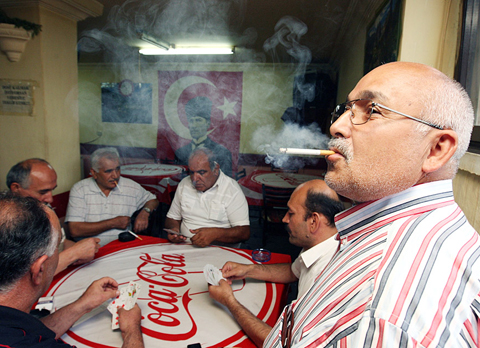Turkey’s government is setting up a 4,500-strong team to help enforce an upcoming smoking ban in bars, restaurants and coffeehouses in the country of heavy smokers, a Health Ministry official said on Thursday.
On Sunday, a year-old ban on indoor public smoking will be widened to include bars, restaurants and even smoky, hazy village coffeehouses and hookah bars. The ban already covers offices, public transport and shopping malls.
Turkish Prime Minister Recep Tayyip Erdogan’s Islamic-rooted government has dismissed the protests and calls for the ban to be postponed.

PHOTO: AP
A Health Ministry official said the force would carry out surprise checks on bars, restaurants and coffeehouses where men traditionally pass time lighting up, drinking tea or coffee, and playing backgammon and card games.
He spoke on condition of anonymity in line with government rules barring civil servants from speaking to journalists without prior authorization.
Patrons breaking the ban will be fined 69 Turkish lira (US$45), while owners who do not enforce the ban could be fined between 560 lira and 5,600 lira.
“To smoke like a Turk” is a common expression in many European countries to describe someone who smokes a lot.
Enforcing smoking bans has proven difficult in the country where around 40 percent of Turks over the age of 15 are smokers, consuming around 17 million packs a day.
Davut Kaya, the owner of a smoke-filled coffeehouse in Ankara, said he fears for his business.
“Ninety percent of my customers are smokers. They come here to get rid of their stress by smoking and playing cards. I cannot see them going outdoors to smoke every 10 minutes. They will stop coming here,” he said.

POLITICAL PRISONERS VS DEPORTEES: Venezuela’s prosecutor’s office slammed the call by El Salvador’s leader, accusing him of crimes against humanity Salvadoran President Nayib Bukele on Sunday proposed carrying out a prisoner swap with Venezuela, suggesting he would exchange Venezuelan deportees from the US his government has kept imprisoned for what he called “political prisoners” in Venezuela. In a post on X, directed at Venezuelan President Nicolas Maduro, Bukele listed off a number of family members of high-level opposition figures in Venezuela, journalists and activists detained during the South American government’s electoral crackdown last year. “The only reason they are imprisoned is for having opposed you and your electoral fraud,” he wrote to Maduro. “However, I want to propose a humanitarian agreement that

ECONOMIC WORRIES: The ruling PAP faces voters amid concerns that the city-state faces the possibility of a recession and job losses amid Washington’s tariffs Singapore yesterday finalized contestants for its general election on Saturday next week, with the ruling People’s Action Party (PAP) fielding 32 new candidates in the biggest refresh of the party that has ruled the city-state since independence in 1965. The move follows a pledge by Singaporean Prime Minister Lawrence Wong (黃循財), who took office last year and assumed the PAP leadership, to “bring in new blood, new ideas and new energy” to steer the country of 6 million people. His latest shake-up beats that of predecessors Lee Hsien Loong (李顯龍) and Goh Chok Tong (吳作棟), who replaced 24 and 11 politicians respectively

Young women standing idly around a park in Tokyo’s west suggest that a giant statue of Godzilla is not the only attraction for a record number of foreign tourists. Their faces lit by the cold glow of their phones, the women lining Okubo Park are evidence that sex tourism has developed as a dark flipside to the bustling Kabukicho nightlife district. Increasing numbers of foreign men are flocking to the area after seeing videos on social media. One of the women said that the area near Kabukicho, where Godzilla rumbles and belches smoke atop a cinema, has become a “real

‘WATER WARFARE’: A Pakistani official called India’s suspension of a 65-year-old treaty on the sharing of waters from the Indus River ‘a cowardly, illegal move’ Pakistan yesterday canceled visas for Indian nationals, closed its airspace for all Indian-owned or operated airlines, and suspended all trade with India, including to and from any third country. The retaliatory measures follow India’s decision to suspend visas for Pakistani nationals in the aftermath of a deadly attack by shooters in Kashmir that killed 26 people, mostly tourists. The rare attack on civilians shocked and outraged India and prompted calls for action against their country’s archenemy, Pakistan. New Delhi did not publicly produce evidence connecting the attack to its neighbor, but said it had “cross-border” links to Pakistan. Pakistan denied any connection to